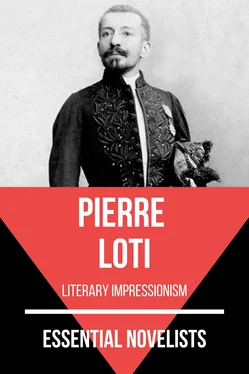Suddenly enters, like a night butterfly awakened in broad daylight, like a rare and surprising moth, the dancing-girl from the other compartment, the child who wore the horrible mask. No doubt she wishes to have a look at me. She rolls her eyes like a timid kitten, and then all at once tamed, nestles against me, with a coaxing air of childishness, which is a delightfully transparent assumption. She is slim, elegant, delicate, and smells sweet; she is drolly painted, white as plaster, with a little circle of rouge marked very precisely in the middle of each cheek, the mouth reddened, and a touch of gilding outlining the under lip. As they could not whiten the back of her neck on account of all the delicate little curls of hair growing there, they had, in their love of exactitude, stopped the white plaster in a straight line, which might have been cut with a knife, and in consequence at the nape appears a square of natural skin of a deep yellow.
An imperious note sounds on the guitar, evidently a summons! Crac! Away she goes, the little fairy, to entertain the drivelling fools on the other side of the screens.
Suppose I marry this one, without seeking any further. I should respect her as a child committed to my care; I should take her for what she is: a fantastic and charming plaything. What an amusing little household I should set up! Really, short of marrying a china ornament, I should find it difficult to choose better.
At this moment enters M. Kangourou, clad in a suit of gray tweed, which might have come from La Belle Jardiniere or the Pont Neuf, with a pot-hat and white thread gloves. His countenance is at once foolish and cunning; he has hardly any nose or eyes. He makes a real Japanese salutation: an abrupt dip, the hands placed flat on the knees, the body making a right angle to the legs, as if the fellow were breaking in two; a little snake-like hissing (produced by sucking the saliva between the teeth, which is the highest expression of obsequious politeness in this country).
“You speak French, Monsieur Kangourou?”
“Yes, Monsieur” (renewed bows).
He makes one for each word I utter, as if he were a mechanical toy pulled by a string; when he is seated before me on the ground, he limits himself to a duck of the head—always accompanied by the same hissing noise of the saliva.
“A cup of tea, Monsieur Kangourou?”
Fresh salute and an extra affected gesticulation with the hands, as if to say, “I should hardly dare. It is too great a condescension on your part. However, anything to oblige you.”
He guesses at the first words what I require from him.
“Of course,” he replies, “we shall see about it at once. In a week’s time, as it happens, a family from Simonoseki, in which there are two charming daughters, will be here!”
“What! in a week! You don’t know me, Monsieur Kangourou! No, no, either now, to-morrow, or not at all.”
Again a hissing bow, and Kangourou-San, understanding my agitation, begins to pass in feverish review all the young persons at his disposal in Nagasaki.
“Let us see—there was Mademoiselle Oeillet. What a pity that you did not speak a few days sooner! So pretty! So clever at playing the guitar! It is an irreparable misfortune; she was engaged only yesterday by a Russian officer.
“Ah! Mademoiselle Abricot!—Would she suit you, Mademoiselle Abricot? She is the daughter of a wealthy China merchant in the Decima Bazaar, a person of the highest merit; but she would be very dear: her parents, who think a great deal of her, will not let her go under a hundred yen—[A yen is equal to four shillings.]—a month. She is very accomplished, thoroughly understands commercial writing, and has at her fingers’-ends more than two thousand characters of learned writing. In a poetical competition she gained the first prize with a sonnet composed in praise of ‘the blossoms of the blackthorn hedges seen in the dew of early morning.’ Only, she is not very pretty: one of her eyes is smaller than the other, and she has a hole in her cheek, resulting from an illness of her childhood.”
“Oh, no! on no account that one! Let us seek among a less distinguished class of young persons, but without scars. And how about those on the other side of the screen, in those fine gold-embroidered dresses? For instance, the dancer with the spectre mask, Monsieur Kangourou? or again she who sings in so dulcet a strain and has such a charming nape to her neck?”
He does not, at first, understand my drift; then when he gathers my meaning, he shakes his head almost in a joking way, and says:
“No, Monsieur, no! Those are only geishas,—[Geishas are professional dancers and singers trained at the Yeddo Conservatory.]—Monsieur— geishas!”
“Well, but why not a geisha? What difference can it make to me whether they are geishas or not?” Later, no doubt, when I understand Japanese affairs better, I shall appreciate myself the enormity of my proposal: one would really suppose I had talked of marrying the devil.
At this point M. Kangourou suddenly calls to mind one Mademoiselle Jasmin. Heavens! how was it he had not thought of her at once? She is absolutely and exactly what I want; he will go to-morrow, or this very evening, to make the necessary overtures to the parents of this young person, who live a long way off, on the opposite hill, in the suburb of Diou-djen-dji. She is a very pretty girl of about fifteen. She can probably be engaged for about eighteen or twenty dollars a month, on condition of presenting her with a few costumes of the best fashion, and of lodging her in a pleasant and well-situated house—all of which a man of gallantry like myself could not fail to do.
Well, let us fix upon Mademoiselle Jasmin, then—and now we must part; time presses. M. Kangourou will come on board to-morrow to communicate to me the result of his first proceedings and to arrange with me for the interview. For the present he refuses to accept any remuneration; but I am to give him my washing, and to procure him the custom of my brother officers of the ‘Triomphante.’ It is all settled. Profound bows—they put on my boots again at the door. My djin, profiting by the interpreter kind fortune has placed in his way, begs to be recommended to me for future custom; his stand is on the quay; his number is 415, inscribed in French characters on the lantern of his vehicle (we have a number 415 on board, one Le Goelec, gunner, who serves the left of one of my guns; happy thought! I shall remember this); his price is sixpence the journey, or five-pence an hour, for his customers. Capital! he shall have my custom, that is promised. And now, let us be off. The waiting-maids, who have escorted me to the door, fall on all fours as a final salute, and remain prostrate on the threshold as long as I am still in sight down the dark pathway, where the rain trickles off the great overarching bracken upon my head.
CHAPTER IV. CHOOSING A BRIDE
––––––––

THREE DAYS HAVE PASSED. Night is closing, in an apartment which has been mine since yesterday. Yves and I, on the first floor, move restlessly over the white mats, striding to and fro in the great bare room, of which the thin, dry flooring cracks beneath our footsteps; we are both rather irritated by prolonged expectation. Yves, whose impatience shows itself more freely, from time to time looks out of the window. As for myself, a chill suddenly seizes me, at the idea that I have chosen to inhabit this lonely house, lost in the midst of the suburb of a totally strange town, perched high on the mountain and almost opening upon the woods.
What wild notion could have taken possession of me, to settle myself in surroundings so foreign and unknown, breathing of isolation and sadness? The waiting unnerves me, and I beguile the time by examining all the little details of the building. The woodwork of the ceiling is complicated and ingenious. On the partitions of white paper which form the walls, are scattered tiny, microscopic, blue-feathered tortoises.
Читать дальше













